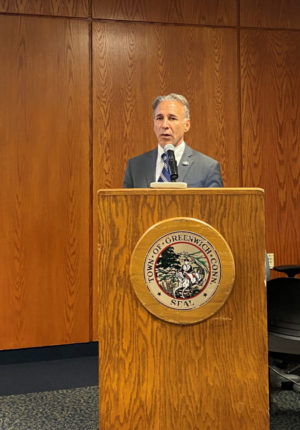Greenwich panel considers the effects of wealth disparity

Photo by Edward Arriaza.
The balance between the haves and have-nots was considered in “Exploring the Wealth Divide in Greenwich,” a recent public forum hosted by Greenwich First Selectman Fred Camillo”™s Diversity Advisory Committee. A panel of representatives from government, academia and the nonprofit sector addressed the subject before an audience at Greenwich Town Hall.
State Rep. Stephen Meskers began the discussion by going against the narrative of Greenwich as an all-affluent, all-white town. According to Meskers, Greenwich is both ethnically and economically diverse, with a population that is around 14% Hispanic and 8% Asian, and approximately 28% falling under the ALICE (asset limited, income constrained, employed) designation, with income levels that just narrowly afford necessities such as food and gas.
“We”™re a fairly diverse town,” Meskers said. “The reputational expectation up in Hartford is that everybody in Greenwich is driving around in a Mercedes.”
With education, Meskers stated the achievement gap between rich and poor is wide and will continue to widen, due in large part to a minimum wage that is not keeping up with rising prices.
“At the state level, we”™ve been relatively active,” Meskers said. “We”™ve kept sales tax off of all food products, we”™ve initiated an earned income tax credit, which is basically a payment to families below a certain income level.”
Camillo followed Meskers and elaborated that many children in Greenwich rely on free or reduced lunch at school to not go hungry, a fact that posed logistical problems when schools shut down. Camillo related his experiences growing up in a blue-collar household, and so empathized with those in Greenwich today who just manage to afford living and rely on programs such as free or reduced lunch.
“Lots of people will go to bed tonight not knowing what next week brings because they struggle,” Camillo said.
Mehmet Cansoy, associate professor of sociology at Fairfield University, then followed by observing, “Being rich tends to be a very sticky thing, much like being poor.” Cansoy”™s presentation focused specifically on the decline of social mobility ”” the ability in a meritocratic society to earn more than one”™s parents. He noted how social mobility has seen a dramatic decline, especially among persons born after 1960.
Cansoy cited how wealth is concentrated amongst the upper class as the cause of the decline. Using the Great Recession as an example, he highlighted the ability of the upper class to stay afloat during times of crises through their concentrated wealth, which acts as a sort of safety net. And so, during the Great Recession, despite fluctuating incomes across the board, “people that had a lot of money were able to hang on,” Cansoy explained.
“This is why we care about wealth, because it doesn”™t fluctuate as much as income does, and it allows us to see inequality getting baked in,” he said.
Cansoy also pointed out that wealthy individuals have an edge with better access to resources and less difficulty attaining credentials through higher education, further “baking in” wealth disparities. Cansoy made several policy recommendations the town of Greenwich can take to combat the disparities, including expanding education programs and providing affordable housing.
David Rabin, president and CEO of Greenwich United Way, took a uniquely interactive approach to presenting findings made on ALICE families”™ economic struggles. According to Rabin, a family of four in Greenwich requires $115,000 dollars to survive.
“That”™s rent,” Rabin said. “That”™s childcare, which is really expensive in town, transportation, food and other necessities.”
Rabin”™s interactive presentation, “Making Tough Choices,” follows the life of a hypothetical ALICE family, composed of two parents and two children, making ends meet through the span of a month.
At certain points in the time frame, Rabin asked the audience, taking on the role of one of the parents, to make financial decisions without going over budget. These included purchasing nutritious food versus unhealthy but cheap food and the choice of electing whether to see a doctor about ongoing physical pain versus buying an over-the-counter remedy.
Although the audience members managed to wade through the financial hurdles and difficult decisions for a month, the interactive exercise demonstrated that ALICE families in Greenwich lead a stressful existence, often on the brink of financial ruin.
Demetria Nelson, commissioner of the Greenwich Department of Human Services, rounded out the panel by examining the “social determinants of health,” of which she identified five. The first, economic stability, would require steady employment, food security and housing stability, and the second determinant, education access and quality, would be elevated by both early childhood education and higher education.
Health care access and quality, as well as neighborhood and infrastructure were the next determinants highlighted by Nelson, who also cited a community”™s cohesion, which can be sustained through civic participation and a lack of discrimination.
Nelson detailed the number of services available to Greenwich residents under economic strain and which have or will be expanded, including mentoring programs for teenagers, temporary financial assistance and continued efforts to increase affordable housing.
“What I want to do, and I hope that I”™ll be able to do, is decrease the amount of stigma associated with asking for help, because we are here, this is what we are here for, this is the nature of what we do,” Nelson said.